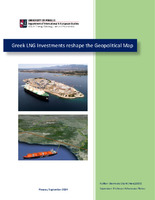Greek LNG investment reshape the geopolitical map

Master Thesis
Συγγραφέας
Gkyrti, Stavroula
Γκυρτή, Σταυρούλα
Ημερομηνία
2024-09Επιβλέπων
Platias, AthanasiosΠλατιάς, Αθανάσιος
Προβολή/
Λέξεις κλειδιά
LNG ; GeopoliticsΠερίληψη
Liquified natural gas is a colorless and non-toxic liquid mostly made up from methane. It is produced by cooling natural gas to -162°C, which facilitates its transportation and storage. In fact, liquefaction reduces the volume of natural gas by a factor of 600 to 1. This provides an additional way to trade natural gas that is safer and more cost-effective for transporting large amounts of gas over long distances or to isolated locations. Besides transportation, LNG offers significant environmental benefits as well compared to the traditional fossil fuels. Although for many this is debatable, LNG has been considered a key-fuel for a smoother energy transition, especially for developing economies. Therefore, LNG is emerging as a valuable alternative energy source by helping countries address some of today’s key challenges: energy security, and climate-related risks. This was further emphasized after the outbreak of the Russo-Ukrainian war in 2022, that brought LNG to the forefront and changed the global geopolitical landscape. This thesis focuses on the case study of Greece, a country with a strategic geographical position and significant large-scale LNG projects taking place that is developing into an important European LNG player, rebalancing the geopolitical relations in the region.


